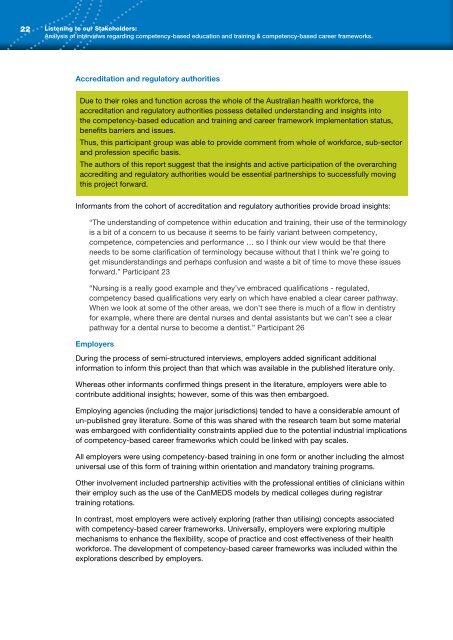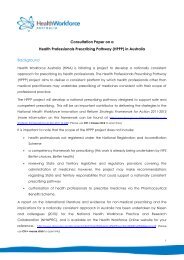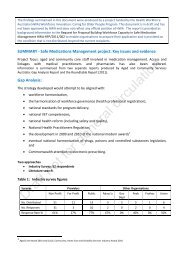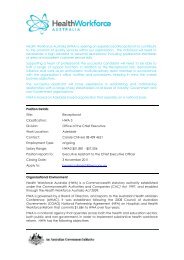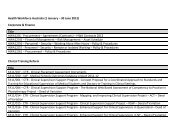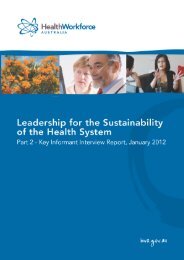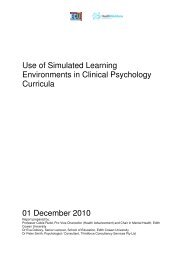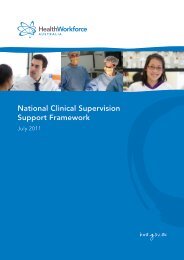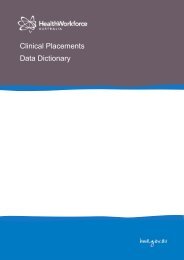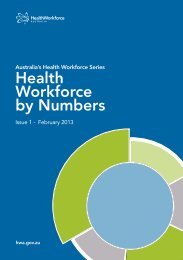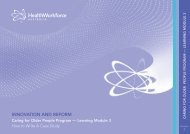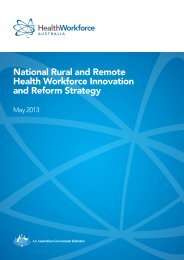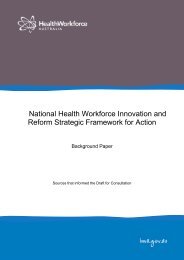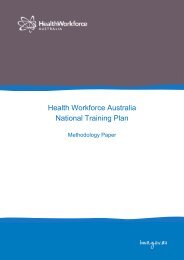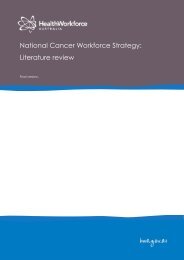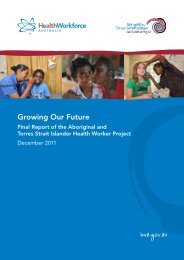Listening to our Stakeholders - Health Workforce Australia
Listening to our Stakeholders - Health Workforce Australia
Listening to our Stakeholders - Health Workforce Australia
You also want an ePaper? Increase the reach of your titles
YUMPU automatically turns print PDFs into web optimized ePapers that Google loves.
22 <strong>Listening</strong> <strong>to</strong> <strong>our</strong> <strong>Stakeholders</strong>:<br />
Analysis of interviews regarding competency-based education and training & competency-based career frameworks.<br />
Accreditation and regula<strong>to</strong>ry authorities<br />
Due <strong>to</strong> their roles and function across the whole of the <strong>Australia</strong>n health workforce, the<br />
accreditation and regula<strong>to</strong>ry authorities possess detailed understanding and insights in<strong>to</strong><br />
the competency-based education and training and career framework implementation status,<br />
benefits barriers and issues.<br />
Thus, this participant group was able <strong>to</strong> provide comment from whole of workforce, sub-sec<strong>to</strong>r<br />
and profession specific basis.<br />
The authors of this report suggest that the insights and active participation of the overarching<br />
accrediting and regula<strong>to</strong>ry authorities would be essential partnerships <strong>to</strong> successfully moving<br />
this project forward.<br />
Informants from the cohort of accreditation and regula<strong>to</strong>ry authorities provide broad insights:<br />
“The understanding of competence within education and training, their use of the terminology<br />
is a bit of a concern <strong>to</strong> us because it seems <strong>to</strong> be fairly variant between competency,<br />
competence, competencies and performance … so I think <strong>our</strong> view would be that there<br />
needs <strong>to</strong> be some clarification of terminology because without that I think we’re going <strong>to</strong><br />
get misunderstandings and perhaps confusion and waste a bit of time <strong>to</strong> move these issues<br />
forward.” Participant 23<br />
“Nursing is a really good example and they’ve embraced qualifications - regulated,<br />
competency based qualifications very early on which have enabled a clear career pathway.<br />
When we look at some of the other areas, we don’t see there is much of a flow in dentistry<br />
for example, where there are dental nurses and dental assistants but we can’t see a clear<br />
pathway for a dental nurse <strong>to</strong> become a dentist.” Participant 26<br />
Employers<br />
During the process of semi-structured interviews, employers added significant additional<br />
information <strong>to</strong> inform this project than that which was available in the published literature only.<br />
Whereas other informants confirmed things present in the literature, employers were able <strong>to</strong><br />
contribute additional insights; however, some of this was then embargoed.<br />
Employing agencies (including the major jurisdictions) tended <strong>to</strong> have a considerable amount of<br />
un-published grey literature. Some of this was shared with the research team but some material<br />
was embargoed with confidentiality constraints applied due <strong>to</strong> the potential industrial implications<br />
of competency-based career frameworks which could be linked with pay scales.<br />
All employers were using competency-based training in one form or another including the almost<br />
universal use of this form of training within orientation and manda<strong>to</strong>ry training programs.<br />
Other involvement included partnership activities with the professional entities of clinicians within<br />
their employ such as the use of the CanMEDS models by medical colleges during registrar<br />
training rotations.<br />
In contrast, most employers were actively exploring (rather than utilising) concepts associated<br />
with competency-based career frameworks. Universally, employers were exploring multiple<br />
mechanisms <strong>to</strong> enhance the flexibility, scope of practice and cost effectiveness of their health<br />
workforce. The development of competency-based career frameworks was included within the<br />
explorations described by employers.


